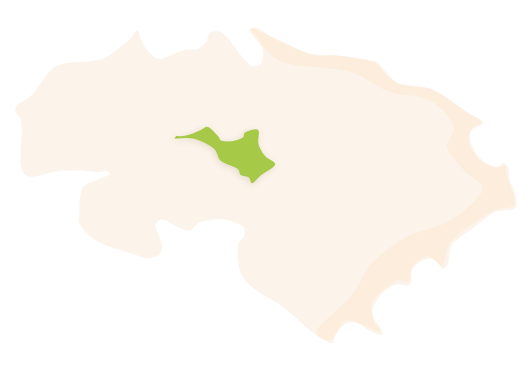Orba is a municipality located in the geographical centre of the region, nestled in the middle basin of the River Girona and including an adjoining hamlet known as Orbeta. The village sits at an altitude of 154 metres, covering an area of 17.70 km² with 2,233 inhabitants, known by the demonym of Orbers or Orberes.
 Orba's municipal district. Surface area: 17.70 km². Population: 2,233 (INE data 2021).
Orba's municipal district. Surface area: 17.70 km². Population: 2,233 (INE data 2021).HISTORY
The village is surrounded by emblematic peaks such as Seguili or Cavall Verd, a historic summit where the Moorish revolt of 1609 took place, just before their expulsion. Along with these two geographic landmarks, El Puig d’Orba creates the municipality’s most characteristic silhouette with the ruins of El Castellet, a hill fort, at its summit. The area’s terrain is determined by the River Girona, it being a fundamental feature of the municipality. This is demonstrated by the numerous conservations of heritage water works including ponds, fountains, washing places, irrigation channels and canals.
Much has been said about the origins and history of Orba’s name without arriving at any decisive conclusions that rule out other hypotheses. Coromines puts its etymological history as Arab in origin, referencing a Berber tribe from Morocco, the Awraba, that is known to have established itself in the area.
Regarding the first human settlement in the area, archaeological excavations at the site of El Castellet have uncovered material dating back to the second millennium BC. Other discoveries have included items corresponding to the Copper and Bronze Ages, in the area surrounding the Lladres cave.
El Castellet itself takes us to what is probably the origin of the current settlement. The lands of Puig d’Orba were given to the Lord of Murla, Berenguer Mercer, so that he could build a settlement on high ground. However, it would appear that at the top of Puig d’Orba at least one watchtower or Almohad settlement had already existed.
Little or nothing can be found in mediaeval documentation regarding the town centre of Orba. The lands were ceded in 1323 to prince Pere de Ribagorça, son of Jaume II (1267-1327), after passing through the hands of the counts of Oliva, the dukes of Gandia and, finally, the dukes of Osuna. As for the village itself, we know that by 1534 it was already well established. According to the notes of Sanchis Sivera, Orba was separated from Murla as an estate, serving as a Moorish rectory, with the estates of Tormos and Ísber becoming later additions to the parish. After the expulsion of the
Moriscos in 1609, Orba was left sparsely populated, a settlement charter in 1611 repopulating it once again with residents of Pego, Murla and Majorca.
It should be noted that the municipality has traditionally been a centre of pottery production, supplying almost the entire region with its production of kitchen pottery including bowls, pots and earthenware jugs, as well as ceramics used in construction such as tiles and latticework, the latter known as gasparilles and patented by a local potters.
FESTIVITIES
- Festivities in honour of the patron saint, La Mare de Déu dels Desemparats (Our Lady of the Forsaken), are held on the days around the second Sunday of May.
- Festivities in honour of the patron saint of Orbeta, Santíssim Crist de l'Agonia (Most Holy Christ of Agony), are held on the second weekend in July. Masses and a procession are organised along with the "Barraca d'Orbeta", a temporary structure that forms the centre of the festivities.
- The festes populars d'Orba (Orba’s annual festivities) happen on the second weekend in July.
GASTRONOMY
- Bollos (traditional sweet breads).
- Blat picat (regional stew of meat, vegetables, chickpeas and whole wheat).
- Figatell (pork meat and offal faggots).